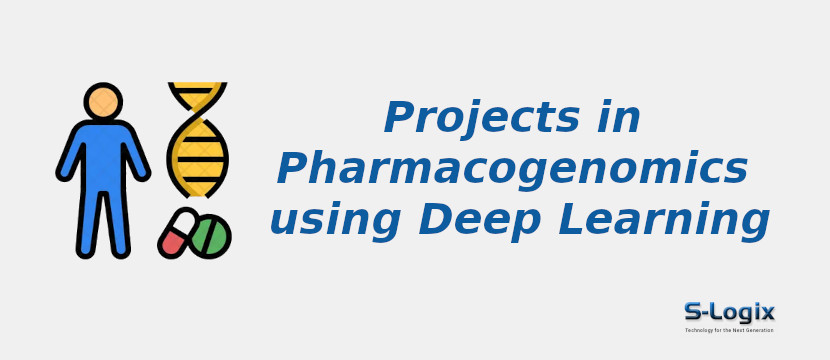Project Background:
Pharmacogenomics using deep learning is grounded in the pursuit of personalized medicine and the intricate interplay between genetic information and drug response. Traditional drug development and prescription approaches often overlook the genetic variations that influence individual medication responses. Pharmacogenomics, a field at the intersection of genomics and pharmacology, seeks to understand how an individuals genetic makeup influences their response to drugs. Deep learning emerges as a powerful tool in this context, offering the ability to analyze vast genomic datasets with complex relationships. By leveraging deep neural networks, the project aims to uncover subtle and non-linear patterns within genetic information that may indicate drug response, adverse reactions, or optimal treatment strategies. This project aligns with the broader goal of bridging the gap between genetic insights and clinical decision-making in pharmaceutical interventions.
Problem Statement
- The problem in pharmacogenomics using deep learning revolves around the need to bridge the gap between genetic information and drug response for personalized medicine.
-
The challenge lies in the complexity of deciphering the intricate relationships between genomic data and drug outcomes.
-
Conventional methods struggle to capture the non-linear and subtle patterns within vast datasets of genetic information, leading to suboptimal predictions of drug efficacy and potential adverse reactions.
-
The problem statement is to develop robust deep-learning models that can effectively mine and interpret genomic data to predict individual responses to specific drugs accurately.
Aim and Objectives
- This project uses pharmacogenomics to enhance personalized medicine by deciphering complex relationships between genetic information and drug responses.
-
Develop deep learning models for analyzing genomic data to predict individual responses to specific drugs.
-
Explore non-linear patterns within genetic variations to improve the accuracy of drug response predictions.
-
Enhance model interpretability to translate deep learning insights into actionable clinical decisions.
-
Optimize drug treatments based on individual genetic profiles, minimizing adverse effects and improving overall patient outcomes.
Contributions to Pharmacogenomics Using Deep Learning
1. Develops robust deep learning models specifically tailored for analyzing genomic data, enabling accurate predictions of individual responses to specific drugs.
2. Explores and identifies non-linear patterns within genetic variations, improving the precision and reliability of predictions for drug responses.
3.
Contributes to overcoming challenges associated with data heterogeneity in pharmacogenomic datasets, ensuring the development of models that can effectively handle diverse genetic information.
4.
Conducts a comprehensive evaluation of deep learning-based pharmacogenomic models, comparing their performance against traditional methods to provide insights into the advantages of this approach.
5.
Contributes to the broader advancement of personalized medicine by providing practical insights and tools for clinicians to make more informed and individualized drug prescriptions, ultimately improving patient care.
Deep Learning Algorithms for Pharmacogenomics
- Convolutional Neural Networks (CNNs)
-
Recurrent Neural Networks (RNNs)
-
Long Short-Term Memory networks (LSTMs)
-
Gated Recurrent Units (GRUs)
-
Transformer models
-
Autoencoders
-
Variational Autoencoders (VAEs)
-
Graph Neural Networks (GNNs)
-
Attention Mechanisms
Datasets for Pharmacogenomics
- The Cancer Genome Atlas (TCGA)
-
Genotype-Tissue Expression (GTEx)
-
International HapMap Project
-
Database of Genomic Variants (DGV)
-
The Human Genome Diversity Project (HGDP)
-
Exome Aggregation Consortium (ExAC)
-
Single Nucleotide Polymorphism Database (dbSNP)
-
Genetic Testing Registry (GTR)
Performance Metrics
- Accuracy
-
Precision
-
Recall
-
F1 Score
-
Area Under the Receiver Operating Characteristic curve (AUC-ROC)
-
Area Under the Precision-Recall curve (AUC-PR)
-
Matthews Correlation Coefficient (MCC)
-
Concordance Index (C-index)
Software Tools and Technologies
Operating System: Ubuntu 18.04 LTS 64bit / Windows 10
Development Tools: Anaconda3, Spyder 5.0, Jupyter Notebook
Language Version: Python 3.9
Python Libraries:
1. Python ML Libraries:
- Scikit-Learn
- Numpy
- Pandas
- Matplotlib
- Seaborn
- Docker
- MLflow
2. Deep Learning Frameworks:
- Keras
- TensorFlow
- PyTorch
